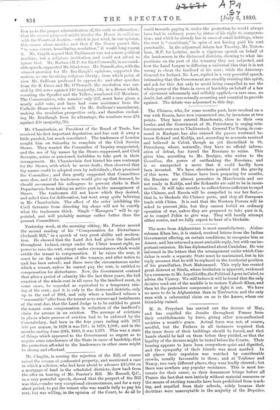Yesterday week, at the morning sitting, Mr. Forster moved the
second reading of his "Compensation for Disturbance (Ireland) Bill," in a speech of very great ability and modera- tion. He showed that the Land Act had given the landlord throughout Ireland, except under the Ulster tenant-right, no power to raise the rent, except under circumstances which would entitle the tenant to compensation. If he raises the rent, it must be on the expiration of the tenancy, and after notice to quit has been served ; and these were the circumstances under which a tenant, unless he cannot pay the rent, is entitled to compensation for disturbance. Now, the Government contend that after a period of zalamity like the last three years, the full exaction of the whole rent in all cases by the landlord must, in some cases, be regarded as equivalent to a temporary rais- ing of the rent; and it is only in the distressed districts, only up to the end of 1881, and only where a landlord refuses a "reasonable "offer from the tenant as to arrears and instalments of the rent due, that the Land Judge is to be entitled to grant the tenant some compensation in reduction of the landlord's claim for arrears in an eviction. The average of evictions in places where process of eviction had to be enforced by the Constabulary, had been in the four years ending with 1877 503 per annum, in 1878 it was 743; in 1879, 1,098; and in the months ending June 20th, 1880, it was 1,073. This was a state of things which appeared to the Government so urgent as to require some interference of the State in cases of hardship, that the protection afforded to the landowners in other cases might be strong and effectual.


































 Previous page
Previous page